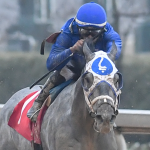
Preakness Quick Sheet: Get to Know the 2021 Preakness Horses

Mental toughness.
All jockeys must possess that quality to some extent merely to be willing to enter the starting gate with half-ton Thoroughbreds. Gary and Scott Stevens have taken mental toughness to another level, to where it can best be described as mental ferocity.
Gary had enough body parts replaced – knee and hip – that he became known as racing’s “bionic man.” He retired and unretired twice before a spinal injury in November, 2018 left him no choice but to call it a Hall of Fame riding career after 5,187 victories.
Scott returned from life-threatening injuries suffered in a horrific riding accident at Canterbury Park in 2010. He continues to ride so effectively that, at age 59, he recorded his 5,000th career victory, leading throughout with Royal Privacy in the fourth race at Turf Paradise in Phoenix on March 9.
Gary and Scott are the only brothers to achieve the 5,000-win milestone. They also hold the distinction of being the only brothers to each win the George Woolf Memorial Award, presented annually since 1950 to a jockey who demonstrates high standards of personal and professional conduct.
“We both more than achieved what we expected to do when we started out in this crazy game,” Gary said.
From the time they were boys, they pushed each other. They were both avid and skillful wrestlers, but their makeup was such that they struggled to keep it a friendly competition. “Sometimes it became more than a wrestling match,” Gary said.
Each did his darndest to win when they rode against each other earlier in their careers. “When we were on the track, we were competitive for sure,” Scott said. “But we were always happy when the other one did well.”
Gary, of course, did remarkably well. He was voted into the National Museum of Racing’s Hall of Fame in 1997. His win total includes nine triumphs in Triple Crown races, three of those in the Kentucky Derby. He finished with more than $258.9 million in earnings.
Scott has spent much of his career riding at smaller tracks such as Turf Paradise and Canterbury Park and his earnings, still robust at more than $43 million, reflect that. His 5,000th win was perhaps fitting in that it came aboard a 7-year-old gelding running five furlongs on the dirt in a race for $3,000 claiming horses. He has yet to win a stakes race above the Grade 3 level. Perhaps his greatest claim to fame is that he rode 1998 Kentucky Derby and Preakness winner Real Quiet when that colt was a 2-year-old.
Scott and his partner, Pam Iles, were intently focused on doing what was best for their children. Scott began riding regularly at Turf Paradise in 1992 because that meet overlapped the school year.
“I wouldn’t change anything that way,” Scott said. “I’m content with what I have and what I do.” He has been the leading rider at Turf Paradise nine times.

Gary’s respect for his brother could not be higher. “Between him and Mike (Smith), they are the two best true horsemen that are jockeys that I ever rode with,” he said.
One of the few sharp disagreements Gary and Scott ever had involved whether Scott should resume his career after a 2010 accident that came perilously close to killing him. Scott was aboard a front-running filly when she went down with an injury. Scott tumbled to the track, where four horses could not avoid striking him.
“It literally crushed my chest,” Scott said. “When I was laying on the track, I didn’t know if I was going to make it.”
The presence of Iles, a respiratory therapist who does not always attend the races, went a long way toward saving his life. She sprinted on the track and immediately recognized the dire circumstances.
“I was bleeding really bad out of the mouth,” Scott said. “She was aware I had collapsed lungs and told them what to do. She saved my life.”
Scott was hospitalized for seven days, including the first three in intensive care. As he slowly recovered, the issue became what the next chapter of his life would be. His parents, Barbara and Ron, urged him to retire. So did Gary.
“How much is enough?” Gary remembers asking Scott.
“No,” Scott replied. “I’m not done.”
He returned to competition four-and-a-half months after leaving the track in a medical helicopter. And he rides on, saying he will continue as long as he maintains his health and enthusiasm and is helping his mounts.
“Unless you do it,” Scott said, “you can’t explain the thrill that it is.”